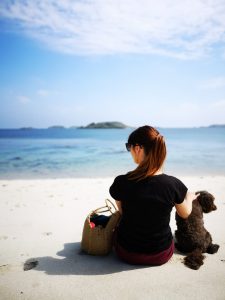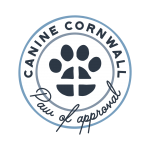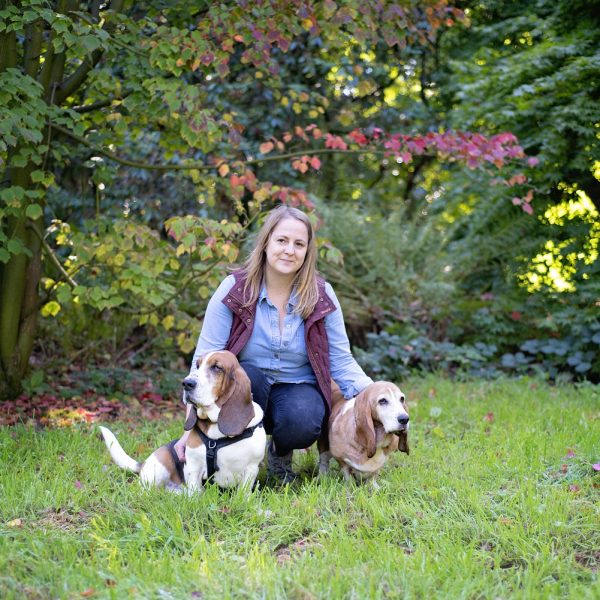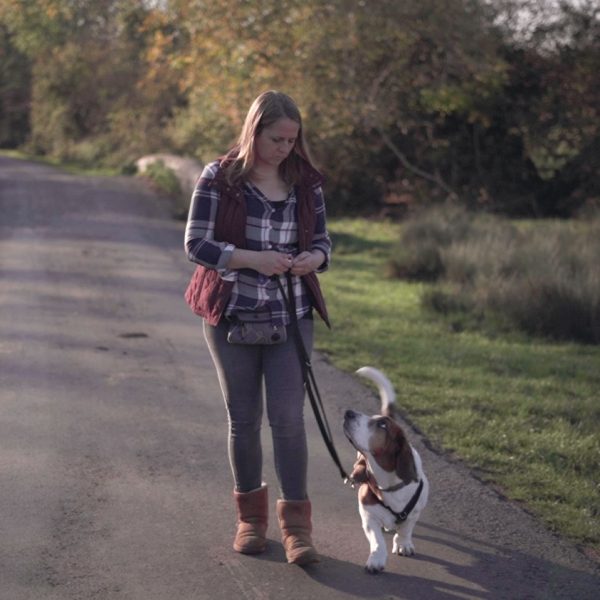

In the wake of COVID, staycations are having a continued renaissance, with many UK dog owners choosing to stay in the UK instead of travelling abroad; which means that nine in ten dogs will be on holiday too, with as many as eight million dogs on the move. Devon and Cornwall are home to a myriad of dog-friendly accommodation offerings, so why not pack your furry side kick’s bag to accompany you on your holidogs travels this year?
Partridge is a seasoned traveller, regularly setting her paws across the threshold of luxury hotels, boutique B&B’s, and unique glamping sites, though that isn’t the case with every dog, with many four-legged companions unfamiliar with travel. To ensure holidaying with your dog at your side is a joy, preparation is key; its definitely worth putting in the groundwork in advance, including trial car journeys, sleeping arrangements, as well as practice of ‘on the leash’ pub lunches in the garden, and in some cases luxury restaurants. Read on to discover leading dog behaviourist, Caroline’s top tips for a fabulous staycation with your dog this summer.
For example, Partridge suffers with car travel anxiety, which causes her to pant and tremble for the entire journey, particularly when we experience bad weather on the roads.
CW – Many dogs find car journeys stressful. This can be due to the emotional connection – cars have taken them away from their first home, transported them to a rescue center where they were abandoned, or just if they are slightly separated from you (their humans) while travelling. It can also be to do with physical issues -the motion makes them feel uncomfortable, the space they travel in doesn’t make them feel secure, or they can’t see what’s ahead of them. Young puppies especially can take a bit of time getting used to
car travel.
If your dog is really scared of the car, seeking out individual support from a canine behaviourist is the best way to help them. Also, taking some time off from car journeys before a big trip can be useful.
During this time, swap out car journeys for car food finds – scattering treats around the space your dog usually travels and allowing them to search for it.
Swapping where your dog travels can sometimes change their response to the journey too. If they usually travel in the boot, you could try a crate or dog harness in the back seat. The most important thing is they have as firm a base underneath them as possible and that they are safe from any sudden movements. You could also try blacking out windows with stick-on sunshades – as they might not like seeing the world whizz by.
Getting your dog used to short, positive experiences in the car is great preparation for going on holidays with your dog. Set them up with some treats or something to chew in their travelling spot and take them just a few minutes down the road. Once you’ve arrived, make sure they’re meeting up with a friend or going for one of their favourite walks.



Partridge suffers with separation anxiety and though we always have her dine with us where allowed, there are some hotel restaurants that aren’t dog friendly. She will normally howl and bark when left alone, which can be problematic, disturbing other guests.
CW – Some dogs will naturally relax in new environments – but for many, especially during the first couple of nights, it takes time to feel relaxed. Many holiday locations won’t allow dogs to be left unattended – so it’s also always worth checking that in advance. Plan your trip so you’re not leaving them alone during at least the first few days.
In a recent study conducted by Forthglade, 44% of dog owners noted they were concerned about separation anxiety after lockdown. We’ve all been around our dogs a lot more during the past year and Separation Related Problems are on the increase.
Travelling with a dog that suffers from Separation Anxiety really does require planning. If they are unable to feel safe and secure when alone in their own home, it’s very unlikely they’ll be able to relax somewhere new. Leaving them alone will leave them feeling very stressed – plus there’s the chance of damage to the property you’re staying in or noise disturbances.
While I would never recommend leaving a stressed dog alone, if there is simply no way around it then you might want to look into some natural calming supplements from your vet (just make sure you’ve tried them at home first) and prep plenty of tasty food toys that your dog is safe to be left with. Unfortunately, a highly stressed dog is unlikely to be distracted by food, but if your dog just needs a small amount of help to relax then chewing is great for this.
CW – If your dog is used to getting onto furniture in your own home, then the best way to prevent any hair, mud, or sand making its way onto the hotel furniture is to pack plenty of thick clean blankets to cover things with.
If there is a “no dogs on furniture” policy where you’re staying, then you’ll need to put some preparation in advance. Teach your dog a “settle” on a specific bed – and build up the time they feel comfortable
hanging out on it. Take this bed with you on your travels and reward your dog with something yummy every time they go and relax on it.
Preparation is Key – Consider writing a list of things to remember to pack including, treats, toys, bed and blanket, poo bags as well as any medication your dog may be taking.
Adventures with puppies – Creating positive early new experiences can be a good way to set your dog up for a lifetime of successful adventures. Try not to cram too many activities into each day, and ensure your pup has lots of rest time and quality sleep.
Home from Home – Pack items that your dog is familiar with, that will make them feel more comfortable and at ease in a new environment, for example, their favourite treats, bed, blanket and toys.
Seek out Calm Spaces – Try avoiding the crowds, and instead seek out unique, off-the-beaten-track walks or consider walking at a National Trust site or Woodland Trust walk. Walking in quiet spaces will allow you to fully engage in your environment – and with your dog – you will both be happier and healthier for it.
Too much of a Good Thing – However tempting it may be, try not to share your pub lunches and ice cream with your furry friend as this can wreak havoc on their behaviour as well as their tummies. Too much sugar can cause dogs to be hyper, whilst too many new flavours can end up in multiple overnight toilet trips – not so relaxing for your staycation!
Solo Time? Be sure to check the rules relating to leaving your dog alone in the bedroom, holiday rental cottage etc. For some dogs a little human-free downtime between adventures can be greatly received, but if your dog hasn’t been left alone in a new space before, you will need to ensure they’re not getting stressed or anxious. Never leave them alone in the first 24 hours, as they won’t have had chance to get used to their new environment.
Safe and Calm Travels – One of the biggest causes of concern for dog owners holidaying with their pets, is car travel. It’s really important to get your dog used to longer journeys in the car slowly, in advance of your holiday. Plan regular comfort breaks so they have toileting opportunities, stretch their legs and a nice sniff!
Making Memories – One of the best things about holidaying with your dog is the uninterrupted time you get to spend together. Many dog owners find that holidaying together strengthens the bond, providing the chance to relax together, without any of the everyday distractions; the perfect opportunity to enjoy a digital detox, with a focus on having fun with your four-legged friend!
CAROLINE’S MUST HAVE ITEMS FOR TRAVELLING WITH YOUR DOG
Towels and Blankets – Whether you’re heading to the beach or the hills – a wet dog isn’t going to be appreciated, even in the most dog friendly of hotels or restaurants. As well as providing warmth, blankets can double up as great “settle mats” for placing on the floor next to you, while you’re eating or relaxing in a dog-friendly pub or cafe.
Water Bottle/Bowl – Even in the cooler months, if your dog is expelling more energy than usual on their fun adventure-walks, you need to ensure they stay hydrated. A travel water bottle is great for clipping onto a backpack for your holiday hikes! It can also be worth bringing some water from home, at least for the first couple of days, as a change in water quality can upset a dog’s stomach.
Something that smells of home – Dog’s rely so much on scent for information. If you bring a bed, blanket or some toys that they’ve had (unwashed) at home, this will help bring a sense of familiarity into the new environments you stay.
Longline / ID tags – If your dog’s recall is less than perfect, you don’t want your holidays ruined by losing them somewhere unfamiliar. A long training lead helps keep everyone safe and can be dropped or removed in places you feel are more secure. Having an ID tag made up for your dog with the number of the hotel you are staying (alongside your mobile number) is useful if you are in an area of poor signal.
Food – While it can be tempting to spoil our dogs with lots of different yummy treats as part of their holiday, it can lead to stomach upsets and trips outside during the night. Not very relaxing for anyone! If you’re unable to transport your dog’s food easily for your trip, research in advance to find local pet shops that stock your dog’s food brand.

Caroline Wilkinson is a Certified Animal Behaviourist, and the Founder of digital pet coaching service Barket Place. Caroline has a passion for improving connections between human and hound, with a focus on relationships and reduction of stress for canines living in a human world.

Sign-up to the Canine Cornwall newsletter to sniff out news, reviews, competitions and special offers.